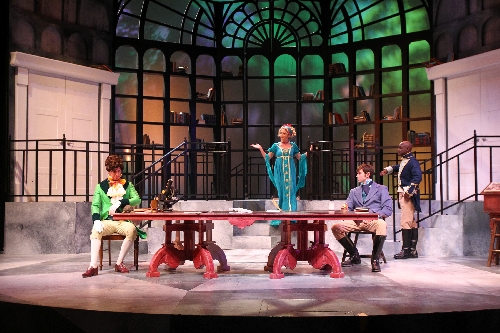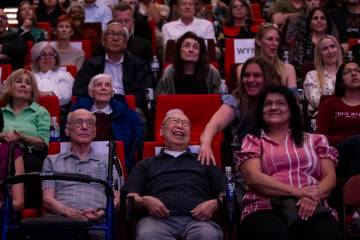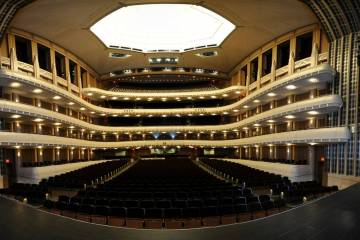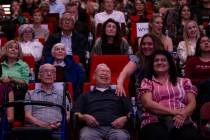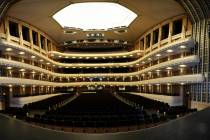‘Arcadia,’ opening seven-performance run tonight, thick with conflict
If you've seen the Oscar-winning "Shakespeare in Love" - or if you're planning to see the "Anna Karenina" adaptation scheduled to hit movie theaters today - you know Tom Stoppard's work.
But to truly know Tom Stoppard, you need to see his plays.
And the Nevada Conservatory Theatre, continuing its 10th-anniversary celebration, obliges with a production of Stoppard's 1993 "Arcadia," opening a seven-performance run tonight in the Judy Bayley Theatre at the University of Nevada, Las Vegas.
"Arcadia" is widely considered the masterwork by a playwright who's written more than a few, including "Rosencrantz and Guildenstern Are Dead" and "The Real Thing." (To cite two of Stoppard's four Tony-winners.)
Reviewing the original production, the Times of London praised it as the "perfect marriage of ideas and high comedy," while Britain's The Independent published a 2009 reappraisal (on the eve of "Arcadia's" London revival) with the headline "Is Tom Stoppard's 'Arcadia' the greatest play of our age?"
Even those who'd reply "no" would be hard-pressed to dismiss "Arcadia's" Stoppard trademarks, from dazzlingly witty wordplay to dizzying, dense-packed allusions encompassing literature, science, even metaphysics.
To say nothing of the endless - and endlessly maddening - battle between head and heart.
"It's a beautiful, amazing masterpiece of a play," says Christopher Edwards, who's directing the NCT production. "But it's no easy play."
That becomes immediately apparent when you consider what it's "about" - an eclectic list of concerns including "determinism, landscape gardening, chaos theory and the laws of thermodynamics," Edwards notes.
And then there's that crazy little thing called love - as perceived, and experienced, by two sets of characters in two separate centuries who learn "how affairs of the soul and the heart conflict with affairs of the mind," he observes.
"Arcadia's" action, set in 1809 and contemporary times, takes place at Britain's Sidley Park, the elegant Coverly family estate.
The stately home's 19th-century denizens include Septimus Hodge (Jordan Bondurant ), a young science graduate tutoring the precocious 13-year-old Thomasina Coverly (Angela Janas ) - who may very well be a way-ahead-of-her-time mathematical genius.
Flashing forward more than a century, "Arcadia" introduces another set of scholars.
Author Hannah Jarvis (Lauren T. Mack) has come to investigate Sidley Park's past for a book on "the nervous breakdown of the Romantic imagination." The annoying Bernard Nightingale (UNLV graduate Brooks Asher), meanwhile, is convinced that something bad - involving that mad, bad Romantic poet Lord Byron - once occurred at Sidley Park, and Bernard's just the man to milk "the literary discovery of the century" for all it's worth.
But limiting "Arcadia" to its plot "is literally scratching the surface," Edwards says. "It's a drop in the Pacific Ocean."
That's because, as in his other plays, Stoppard "deals with big ideas and big thoughts," Edwards says.
In "Arcadia," some of those thoughts center on history and how "truth and fact become a subjective thing," the director says, "based on who's telling the story."
Telling "Arcadia's" story presents its own challenges, in Edwards' view.
"There's the challenge of whether you're smart enough to bring his play to life," says the director. "You're faced with your own intellectual limitations."
And once you overcome those, there's the matter of working with the actors, who must convey the proper period posture - and speak with proper British accents.
Most importantly, the actors must convey the passions driving their characters, who often are too dignified to discuss what they're really feeling beneath all that stiff-upper-lip propriety.
In that sense, "Arcadia's" characters resemble those in Jane Austen's novels - or in the PBS "Masterpiece Theater" hit "Downtown Abbey," Edwards suggests.
After all, "there's something completely human about being passionate about someone and not being able to say so," he says.
Little wonder, then, that Stoppard's plays present a definite contrast to works by such contemporary playwrights as David Mamet and Sam Shepard - muscular, gritty types who conjure "a blue-collar, American feel," says Edwards, a 1992 UNLV graduate who returned to his alma mater to direct August Wilson's "Seven Guitars" last spring.
"Most of the stuff I do is Shakespeare, which is language-driven," explains the New York-based Edwards, associate artistic director of the Hudson Valley Shakespeare Festival.
So is Stoppard.
"It's a heavy language play - it's thick with those conflicts and ideas," Edwards says of "Arcadia."
And its presence on NCT's schedule - alongside Shakespeare's "Romeo and Juliet" and David Lindsay-Abaire's Pulitzer Prize-winning "Rabbit Hole," among others - testifies to "the risk they're actually taking on the artistic front" at NCT, which he calls "a little diamond in the rough."
After all, "you very seldom in the theater world get the opportunity to see a season so chock full of language," Edwards says. "They deserve kudos for what they're trying to do at UNLV."
Contact reporter Carol Cling at ccling@
reviewjournal.com or 702-383-0272.
Preview
"Arcadia"
8 p.m. today and Saturday, 2 p.m. Sunday; also 8 p.m. Dec. 6-8, 2 p.m. Dec. 9
Judy Bayley Theatre, University of Nevada, Las Vegas, 4505 S. Maryland Parkway
$20-$30 (895-2787, pac.unlv.edu)



